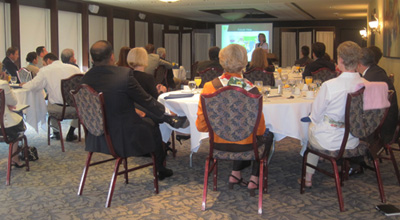DC-area alumni updated on the global economy, financial crisis
At the first-ever WAABA Business Trends Speaker Series breakfast, held June 7 at the Tower Club in Tyson’s Corner, Assistant Dean Deborah Hewitt succeeded in providing an update on the financial crisis that gave attendees "actionable intelligence."
 Using only half a dozen slides, Dr. Hewitt succeeded in putting the financial crisis in perspective. She reminded former students that in 1928, Nikolai Kondratiev observed that since the late 1700s the world had experienced several long economic cycles. As new technologies created new industries, each subsequent surge in employment fueled growth.
Using only half a dozen slides, Dr. Hewitt succeeded in putting the financial crisis in perspective. She reminded former students that in 1928, Nikolai Kondratiev observed that since the late 1700s the world had experienced several long economic cycles. As new technologies created new industries, each subsequent surge in employment fueled growth.
The cycles usually lasted approximately 50 to 70 years, and each economic cycle tended to highlight the strengths of specific countries. Noting the impact of population on potential economic demand, Dr. Hewitt observed that the period she chose to describe as the Internet Technology cycle, starting as recently as 2005, and expected to last another 45 to 50 years, favors the unique population strength of India and China.
As the economic improvement that accompanies globalization reaches the impoverished populations in the rural interior of China and the least exalted castes in India, the surge in economic demand will be felt throughout the global economy. Dr. Hewitt concluded with a graphical map of the world depicting countries according to population size to help the managers appreciate the relative strength of the U.S., China, India, Japan, and Africa in the future global economy.
Along the way, Dr. Hewitt alternated between using the enthusiasm of a high school cheer squad leader and the comforting tones of a mother of teenagers, to help her listeners acknowledge that they are okay, and the economic turbulence that they just experienced, if not normal, is neither disastrous nor unique. Similar events may happen again.
Dr. Hewitt’s depth of academic background in economics allowed her to provide the historical context without overwhelming listeners with economic theory. When one really knows the subject, one does not need to impress.
Drawing on her personal experience in previous presidential administrations, Dr. Hewitt distilled the economic forecast into crisp nuggets managers could walk away with and use immediately to make business decisions.
About WAABA
The William & Mary Washington Area Alumni Business Alliance (WAABA) is an agile and innovative organization that will be a driving force in alumni engagement with the William and Mary School of Business with the specific goal of establishing and nurturing a lifelong partnership with Alumni in the business community through the development of robust and meaningful experiences and engagement opportunities.

